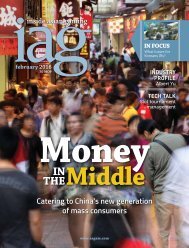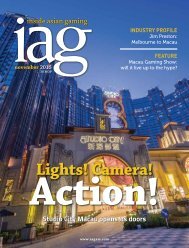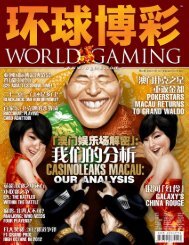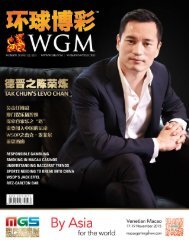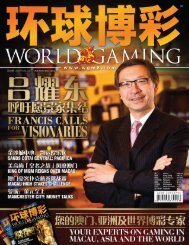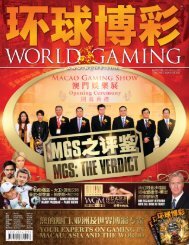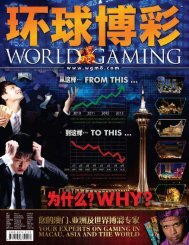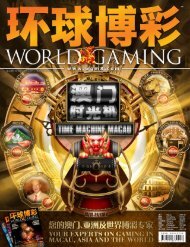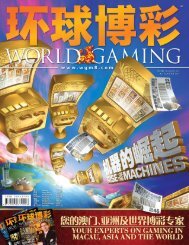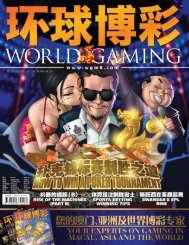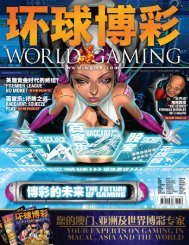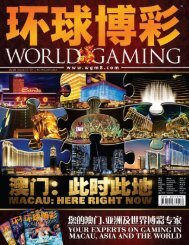Create successful ePaper yourself
Turn your PDF publications into a flip-book with our unique Google optimized e-Paper software.
Blast<br />
from the Past<br />
2010, two months after Mr Genuino was sacked by President Aquino<br />
on suspicion of corruption, his successor, Cristino L. Naguiat, and<br />
a party that included his wife, their children, the nanny and another<br />
PAGCOR officer and his wife ran up a bill over four days at Wynn<br />
Macau in excess of $50,000.<br />
Mr Okada implies that Wynn was complicit in at least some of this,<br />
contending in the Freeh report that “all his efforts in the Philippines<br />
prior to the change of presidential administration in the summer of<br />
2010 were undertaken on behalf of and for the benefit of Steve Wynn<br />
and Wynn Resorts”. The company vehemently denies this.<br />
The FCPA does not prohibit a “reasonable and bona fide<br />
expenditure, such as travel and lodging expenses, incurred by or<br />
on behalf of a foreign official … directly related to the promotion,<br />
demonstration or explanation of products or services; or the<br />
execution or performance of a contract with a foreign government or<br />
agency thereof.”<br />
What it does prohibit is conduct like that of a California<br />
telecommunications company that was slapped with an enforcement<br />
action for spending several millions of dollars over a period of years<br />
for hundreds of customer trips arranged for the purpose of obtaining<br />
systems contracts in China. These included visits by employees of<br />
state-owned companies to popular US tourist destinations. The trips<br />
were purported to be for “training,” and approximately $670,000<br />
of the expenses was falsely recorded as such. A New Jersey-based<br />
telecom ran into similar trouble over hundreds of trips by Chinese<br />
government officials ostensibly for training and facility inspections<br />
that masked holidays in New York City, Las Vegas, Hawaii, Disney<br />
World, the Grand Canyon and Niagara Falls. The expenses were<br />
either not recorded or falsely listed on the books as “consulting fees,”<br />
the Justice Department says. This included cash that was handed to<br />
some of the officials for spending money.<br />
According to the Freeh report, everyone in Mr Naguiat’s party<br />
received US$5,000 in credit for “shopping and gaming”. This was<br />
granted at the request of Mr Okada’s representatives and charged to<br />
the Universal/Aruze USA account. Another 80,000 Macau patacas<br />
(approximately $10,000) was advanced from the cage and charged<br />
to the Universal/Aruze account for a Chanel bag Mr Naguiat wanted<br />
for his wife.<br />
If it is true, as Wynn’s suit alleges, that Mr Okada’s representatives<br />
Meet the new boss<br />
Cristino L. Naguiat<br />
also wanted the stay to be kept secret and instructed the hotel that<br />
Mr Naguiat would not register as a guest (he would be listed by<br />
VIP Services as “Incognito” followed by his name) that could prove<br />
especially damning from the standpoint of the FCPA. The same goes<br />
for the accusation that they wanted to conceal some of the costs by<br />
laying them off on Wynn Macau. This included accommodations at<br />
the “most expensive” suite at the property, the 7,000-square-foot<br />
Villa. This was refused, according to the Freeh report.<br />
Mr Okada denies any knowledge of or involvement in wrongdoing<br />
at the company.<br />
Wynn likewise maintains that it has followed the law both in letter<br />
and spirit. In August 2011, the month the Compliance Committee<br />
commissioned its second investigation into the Philippines, a notice<br />
was issued to all the members of the board to report in October<br />
for training on the Foreign Corrupt Practices Act. They also were<br />
instructed to review the company’s “Code of Business Ethics” and<br />
“Policy Regarding the Payment to Government Officials” and to<br />
confirm in writing that they had read and understood them. Wynn<br />
says every director signed this “Code of Business Conduct and Ethics<br />
Acknowledgement” save one, Kazuo Okada. He notified the board<br />
that he would attend the FCPA training, the company says, but the<br />
week before it was to start he asked for the training materials to be<br />
translated into Japanese. He also wanted the date of the training<br />
moved. He never attended.<br />
The lawyers at Latham & Watkins, a US-based practice specializing<br />
in international law and regulation, say an effective compliance<br />
program should be able to satisfy at least three basic questions:<br />
Is the program well-designed?<br />
Is it applied in good faith?<br />
Does it work?<br />
Currently, the FCPA does not provide for an affirmative<br />
compliance defense. The US Chamber of Commerce, among others,<br />
believes it should.<br />
So does Mr Koehler. “What you’re dealing with is not the law,” he<br />
says, “but the Justice Department’s and the SEC’s view of the law and<br />
in some cases that view has been rejected by the courts.”<br />
The chamber also wants the Act amended so that “willfulness”<br />
has to be proved for a company to be criminally liable. (Currently,<br />
this applies only to individuals.) They also want limitations on a<br />
company’s liability for the acts of its subsidiaries.<br />
For now, though, good intentions will carry only as much weight<br />
as federal prosecutors choose to accord them.<br />
“It’s the enforcement agencies’ view that’s important,” Mr<br />
Koehler says. “They hold the big stick.”<br />
<strong>December</strong> <strong>2015</strong> inside asian gaming 39



